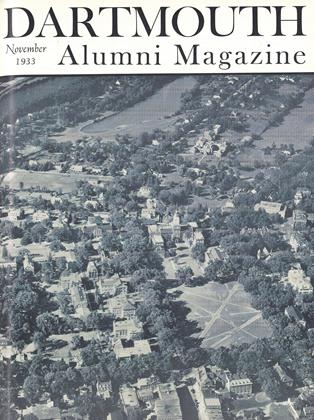By Roy Bullard Chamberlin, Abingdon Press. 1933.
These twenty-two stories of success are more newsworthy in 1933 than they would have been in 1929. The sympathetic reader of Winners cannot help but feel the optimism, the faith in human guts, the reality of victory against odds, which Mr. Chamberlin has found in the persons whose stories he relates. The cynical reader may object that such courage and endurance do not often fall under his observation. To this, the author would readily agree. He too is no Pollyanna; he knows that he is expounding the exception, not the rule of life on college campuses today. I am not aware, however, of any reason for thinking that a virtue depreciates in value because it happens to be rare.
Mr. Chamberlin has spent many years successfully helping and encouraging schoolboys and college men who were up against odds of ill health, of poverty, and of unpopularity. Out of hundreds of cases personally known to him, he has selected a score of the most dramatic for this book. Some of the situations may seem uncommon and the ideals held by a few of the students may appear to be unfamiliar. But the strangest feature of the book is that the stories are all true. Many of the characters are well known in Hanover. I do not know whether the author secured their permission to quote from their lives, but the pleasure of recognition is an added attraction for the Dartmouth reader. For the most part, however, the tales are too short for effective characterization. They are anecdotes, or rather, incidents illustrating character under stress. Among my favorites are (1) Mountain Disaster, the account of a memorable trip to Mt. Washington still fresh in the minds of many; (7) One Arm, a record of one of the most remarkable personal achievements I have ever known; (10) Hill Billy, the career of a "Hick" at Dartmouth; and (19) Crippled.
The stories are written with a sincerity and a familiarity that leave no doubt about the authenticity of the material. Two minor elements of improbability, however, seem to me to have crept into the author's style. First, the dialogue is occasionally staged in a setting that does not seem quite natural. I doubt whether many students would permit another to tell a long story with a moral between the periods of an exciting hockey game. It no doubt happened, but the circumstances are a bit unconvincing. Secondly, the author has sometimes cleaned up collegiate diction too much, out of excess consideration for the gentle reader. The epithets used by athletes to express anger or astonishment are too euphemistic, unless my ears have been grossly deceiving me for years. Instead of "Gosh" and "Gee Whiz", I read on in vain for a throaty "Damn". But perhaps I am old-fashioned, perhaps damns have had their day.
Every author has to select his special audience; he cannot hope to speak the language equally of old and young. Mr. Chamberlin has written, in my opinion, admirably for the ages of, say, 13-17.1 hope he will go on and write another book expressly for college men as well as about them. A few of the plots of these stories will probably fail to grip the average college man: the worries of the student whose monthly allowance is too generous; the inclination of a team captain to quit because his coach uses profane language; the assumption, in one story, that there is no middle-ground between drunkards and teetotalers. But it is reasonable to answer to this that the author was indifferent to the average reader, and addressed himself to the smaller circle of boys with ideals of their own to which they stick in spite of campus opinion. The ideal may be mildly quixotic, or it may be fundamental to decent manhood. In either case it serves as a test of character. A boy going to college will hunt far before he finds a finer group of college men than those whose adventures are here told. They are not the men featured in films and novels of college life today, but their discouragements, their reverses, and their triumphs are a part of Dartmouth life, and find their parallels in the experience of every college generation. The story their modesty prevents them from broadcasting, Mr. Chamberlin has told movingly in his book which does honor to those men to whom it is dedicated, "Those men of courage and nobility who, without their knowledge, appear in these pages."
 View Full Issue
View Full Issue
More From This Issue
-
 Sports
SportsFOLLOWING THE BIG GREEN TEAMS
November 1933 By C. E. Widmayer '30 -
 Article
ArticleHANOVER BROWSING
November 1933 By Rees H. Bowen -
 Class Notes
Class NotesClass of 1930
November 1933 By Albert I. Dickerson -
 Article
ArticleHistory of the Project
November 1933 By Prof. Artemas Packard -
 Class Notes
Class NotesClass of 1910
November 1933 By Harold P. Hinman -
 Class Notes
Class NotesClass of 1908
November 1933 By Laurence W. Griswold
William A. Eddy
Books
-
 Books
BooksHenry Holt and Company, New York
FEBRUARY 1930 -
 Books
BooksFORESIGHTS IN COLLECTIVE BARGAINING.
January 1947 By C. E. Dankert. -
 Books
BooksGUERNSEY CENTER MOORE FOUNDATION LECTURES
April, 1923 By FRANK MALOY ANDERSON -
 Books
BooksTHE NEW WORLD, 1939/1946.
OCTOBER 1962 By Frank Smallwood ’51 -
 Books
BooksLawmaking
MAY 1982 By Kate Stith Pressman '73 -
 Books
BooksBLACKS IN THE INDUSTRIAL WORLD: ISSUES FOR THE MANAGER.
February 1975 By ROBERT MUNRO MACDONALD



